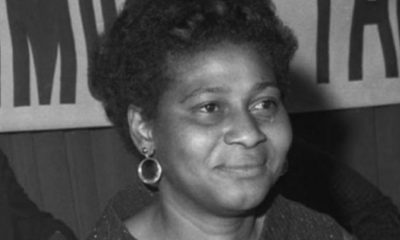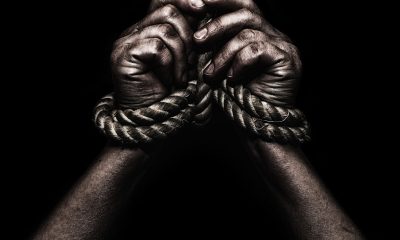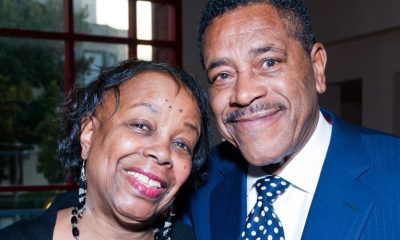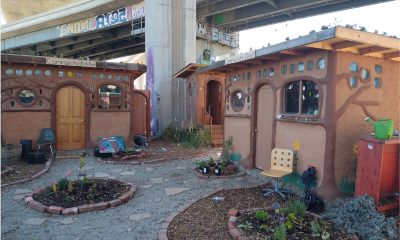Religion
Pope Asks Pardon for Church’s ‘Crimes’ Against Indigenous

Pope Francis waves from his popemobile as he arrives to celebrate Mass at Christ the Redeemer square in Santa Cruz, Bolivia, Thursday, July 9, 2015. After the Mass, Francis’ main event of the day is a keynote speech to a summit of grass-roots groups whose advocacy for the poor and marginalized has been championed by history’s first Latin American pope. (AP Photo/Eduardo Verdugo)
NICOLE WINFIELD, Associated Press
FRANK BAJAK, Associated Press
SANTA CRUZ, Bolivia (AP) — Pope Francis apologized Thursday for the sins, offenses and crimes committed by the Catholic Church against indigenous peoples during the colonial-era conquest of the Americas, delivering a powerful mea culpa on the part of the church in the climactic highlight of his South American pilgrimage.
History’s first Latin American pope “humbly” begged forgiveness during an encounter in Bolivia with indigenous groups and other activists and in the presence of Bolivia’s first-ever indigenous president, Evo Morales.
Francis noted that Latin American church leaders in the past had acknowledged that “grave sins were committed against the native peoples of America in the name of God.” St. John Paul II, for his part, apologized to the continent’s indigenous for the “pain and suffering” caused during the 500 years of the church’s presence in the Americas during a 1992 visit to the Dominican Republic.
But Francis went farther, and said he was doing so with “regret.”
“I would also say, and here I wish to be quite clear, as was St. John Paul II: I humbly ask forgiveness, not only for the offenses of the church herself, but also for crimes committed against the native peoples during the so-called conquest of America,” he said to applause from the crowd.
Then deviating from his prepared script, he added: “I also want for us to remember the thousands and thousands of priests who strongly opposed the logic of the sword with the power of the cross. There was sin, and it was plentiful. But we never apologized, so I now ask for forgiveness. But where there was sin, and there was plenty of sin, there was also an abundant grace increased by the men who defended indigenous peoples.”
Francis’ apology was met with wild applause from the indigenous and other grass-roots groups gathered for a world summit of popular movements whose fight against injustice and social inequality has been championed by the pope.
“We accept the apologies. What more can we expect from a man like Pope Francis?” said Adolfo Chavez, a leader of a lowlands indigenous group. “It’s time to turn the page and pitch in to start anew. We indigenous were never lesser beings.”
The apology was significant given the controversy that has erupted in the United States over Francis’ planned canonization of the 18th century Spanish priest Junipero Serra, who set up missions across California. Native Americans contend Serra brutally converted indigenous people to Christianity, wiping out villages in the process, and have opposed his canonization. The Vatican insists Serra defended natives from colonial abuses.
Francis’ apology was also significant given the controversy that blew up the last time a pope visited the continent. Benedict XVI drew heated criticism when, during a 2007 visit to Brazil, he defended the church’s campaign to Christianize indigenous peoples. He said the Indians of Latin America had been “silently longing” to become Christians when Spanish and Portuguese conquerors violently took over their lands.
“In effect, the proclamation of Jesus and of his Gospel did not at any point involve an alienation of the pre-Columbus cultures, nor was it the imposition of a foreign culture,” Benedict told the continent’s bishops.
Amid an outcry from indigenous groups, Benedict subsequently acknowledged that “shadows accompanied the work of evangelizing” the continent and said European colonizers inflicted “sufferings and injustices” on indigenous populations. He didn’t apologize, however.
The Vatican spokesman, the Rev. Federico Lombardi, said that Francis wrote the speech on his own and that the apology for the sins, offenses and crimes of the church was a “particularly important declaration.”
Church officials have long insisted Catholic missionaries protected indigenous peoples from the abuses of military colonizers and were often punished by European colonial powers as a result. Francis’ own Jesuit order developed missions across the continent, educating the indigenous and turning their communities into organized Christian-Indian societies. The Jesuits were expelled in the 17th century.
Mexican Bishop Raul Vera, who attended the summit where Francis made the apology, said the church was essentially a passive participant in allowing natives to become enslaved under the Spanish “encomienda” system, by which the Spanish king granted land in conquered territories to those who settled there. Indians were allowed to live on the haciendas as long as they worked them.
“It’s evident that the church did not defend against it with all its efforts. It allowed it to be imposed,” Vera told The Associated Press earlier Thursday.
He acknowledged that John Paul had previously asked forgiveness for the church’s sins against indigenous. But he said Francis’ apology was particularly poignant given the setting.
Campesino leader Amandina Quispe, of Anta, Peru, who attended the grass-roots summit, said the church still holds lands it should give back to Andean natives. The former seat of the Inca empire, conquered by Spaniards in the 16th century, is an example.
“The church stole our land and tore down our temples in Cuzco and then it built its own churches — and now it charges admission to visit them,” she said.
Francis’ apology was not the first. After his 1992 apology, John Paul II issued a sweeping but vague apology for the Catholic Church’s sins of the past during the church’s 2000 Jubilee. A year later, he apologized specifically for missionary abuses against aborigines in Oceania. He did so in the first ever papal email.
During the speech, the longest and most important of Francis’ week-long, three-nation South American trip, the pope touched on some of the key priorities of his pontificate: the need to change an unjust global economic system that excludes the poor and replace it with a “communitarian economy” involving the “fitting distribution” of the Earth’s resources.
“Working for a just distribution of the fruits of the Earth and human labor is not mere philanthropy. It’s a moral obligation,” he said.
He ended the speech with a fierce condemnation of the world’s governments for what he called “cowardice” in defending the Earth. Echoing his environmental encyclical of last month, the pope said the Earth “is being pillaged, laid waste and harmed with impunity” while “one international summit after another takes place without any significant result.”
He urged the activists present to “keep up your struggle.”
It was a message he articulated earlier in the day when he denounced the “throwaway” culture of today’s society that discards anyone who is unproductive. He made the comments as he celebrated his first public Mass in Bolivia, South America’s poorest country.
The government declared a national holiday so workers and students could attend the Mass, which featured prayers in Guarani and Aimara, two of Bolivia’s indigenous languages, and an altar carved from wood by artisans of the Chiquitano people.
In a blending of the native and new, the famously unpretentious pope changed into his vestments for the Mass in a nearby Burger King.
___
Associated Press writers Paola Flores, Jacobo Garcia and Carlos Valdez contributed to this report.
___
Nicole Winfield on Twitter: at www.twitter.com/nwinfield
Copyright 2015 The Associated Press. All rights reserved. This material may not be published, broadcast, rewritten or redistributed.
#NNPA BlackPress
COMMENTARY: Prayer is Your Power
Terrible things happen to good people often. We live in an unjust world with people making decisions that are informed more by profit than people. We cannot take those principles into our relationship with God. We must believe that “… all things work together for good to them that love God, to them who are the called according to His purpose.”
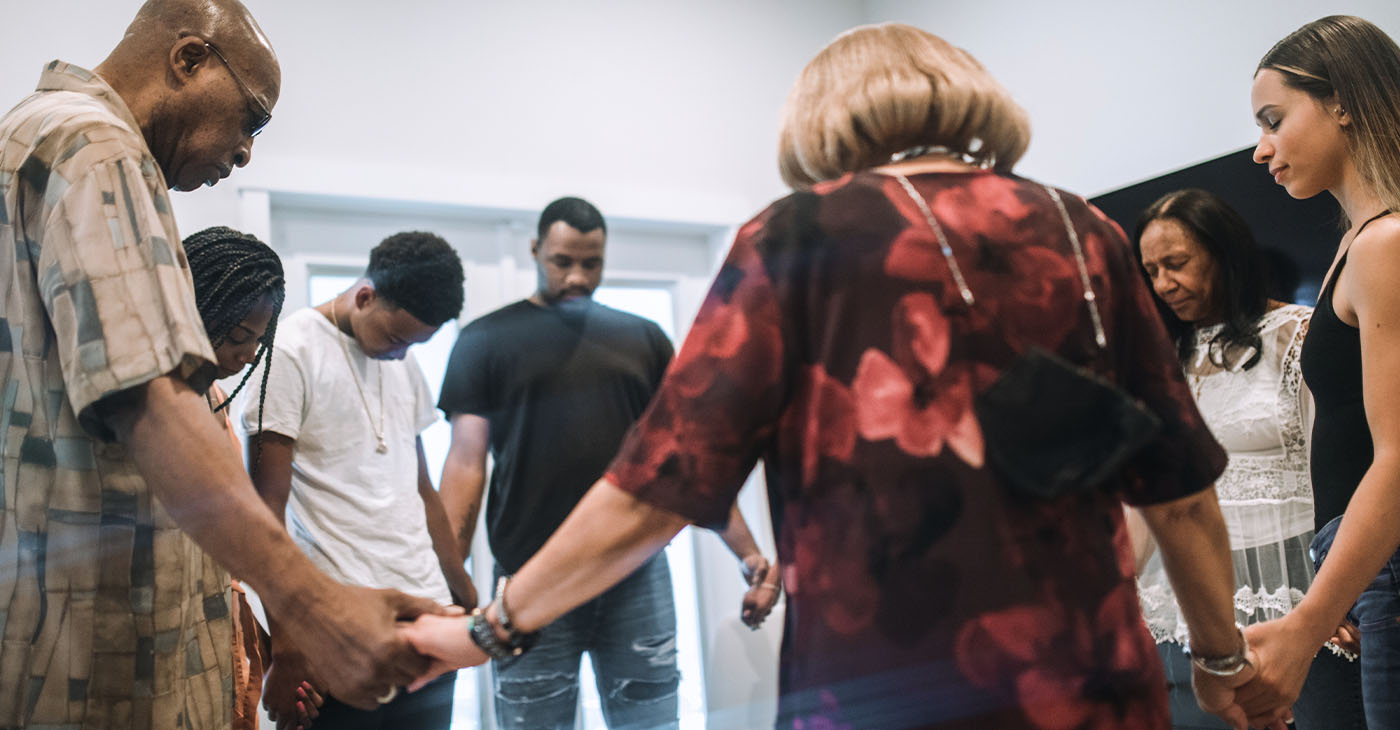
Faithful Utterances
By Dr. Froswa Booker-Drew | Texas Metro News
This week, a friend informed me that she was following the ambulance to the hospital with her husband. Her husband was going through a major health crisis. She wasn’t the only one who reached out—a friend’s mother had unexplained pain and another friend contacted me about her friend’s son who was hospitalized with pneumonia. Each of them asked that I pray for them.
I consider it an honor to pray for others. Prayer is powerful and I love that I have a group of friends who I can turn to that I call the “prayer warriors” that when I send a text to lift up the concerns and issues of others before God, they go into battle mode.
Prayer is a weapon and I think many of us don’t understand its power until we need it. For many of us, it’s a routine, something that’s more about religion than it is about relationship. We have gotten prayer twisted as some exchange solely for stuff. God is not a celestial Santa Claus dropping off gifts. Prayer is an opportunity to go before to God sincerely in relationship. “And when you pray, you must not be like the hypocrites. For they love to stand and pray in the synagogues and at the street corners, that they may be seen by others.
Truly, I say to you, they have received their reward. But when you pray, go into your room and shut the door and pray to your Father who is in secret. And your Father who sees in secret will reward you. And when you pray, do not heap up empty phrases as the Gentiles do, for they think that they will be heard for their many words. Do not be like them, for your Father knows what you need before you ask Him.” (Matthew 6:5–8)
Prayer is about faith. It is believing that God hears us. “Let us then with confidence draw near to the throne of grace, that we may receive mercy and find grace to help in time of need.” (Hebrews 4:16) I realize that my prayers are even more powerful when I am in relationship with others seeking God: “For where two or three are gathered in my name, I am there among them” (Matthew 18:20). It’s dangerous when we see prayer as a way to manipulate God into doing what we want. There is nothing wrong with bringing your requests before God but it’s important to check our motivation and intention. It’s also important to know that just because God doesn’t answer our prayers in the way that we want does not mean that God doesn’t love us.
It doesn’t mean that God does not hear us. It does not negate the omnipotence or goodness of God, either. We must believe that God is able. “And without faith it is impossible to please God, because anyone who comes to him must believe that He exists and that He rewards those who earnestly seek him.” (Hebrews 11:6) It’s easy to blame God when things don’t go the way we want them to—”the rain falls on the just and the unjust” (Matthew 5:45).
Terrible things happen to good people often. We live in an unjust world with people making decisions that are informed more by profit than people. We cannot take those principles into our relationship with God. We must believe that “… all things work together for good to them that love God, to them who are the called according to His purpose.” (Romans 8:28) …. God is concerned with our hearts, with people and cares for us even when things don’t go the way we’d like. I can report that all of the individuals we prayed for had excellent results.
God is good! Yet, I realize that this isn’t always the case. Prayer is powerful. God wants us to have this daily form of communication. 1 John 5:14, tells us: “And this is the boldness we have in Him, that if we ask anything according to His will, He hears us.” Don’t use prayer just when you need something. Just as all relationships require consistent communication for growth and results, the same is even more important in our relationship with God. Prayer is a powerful partnership with God that can move mountains when we believe!
Dr. Froswa’ Booker-Drew is the host of the Tapestry Podcast and the author of three books for women. She is also the Vice President of Community Affairs for the State Fair of Texas. To learn more, visit drfroswa.com.
Black History
AFRICAN-ISH: The First Christmas Story
Both Joseph and Mary were of the lineage of David, Joseph descended from David’s son Solomon (and Bathsheba), and Mary extended from another son Nathan. Therefore, they were required to go to the little town of Bethlehem, in Judea and there, in a cattle shed Jesus was born. (Bethlehem is 70 miles south of Nazareth and 5 miles southwest of Jerusalem).

By Simon Burris
The narrative of Jesus’ birth and proof of his Hamitic (Black) African bloodline* began in the Old Testament in the book of Genesis chapter 10, in the Land of Ham, located in southwest Asia and Africa. Three most prominent Hamitic personalities: Abraham, Isaiah and David.
People and places of Hamitic origins are underlined.
(1) Abraham the patriarch was Babylonian (Ethnic Ethiopian). Gen. 11:31; (2) Isaiah a prophet lived 750 years before Christ, predicted the virgin birth was a nephew of Amaziah a Judahite (Canaanite) king; and (3) David the great king of Israel was a descendant of Abraham, also of Tamar and Rahab (Canaanites).
The (Hamitic) Genealogy of Jesus Christ: Matthew 1:1-17; Luke 3:23-34
The Birth of Jesus: (about 6-4 BC)
Mary the virgin mother of Jesus and her husband Joseph the “foster” father of Jesus, a carpenter, lived in Nazareth, a town in northern Palestine.
At this time Emperor Augustus of the Roman Empire decreed that a census would be taken. Everyone in his domain had to go to his or her hometown to register. He probably ordered Cyrenius ( Quirinius ) the Afro Roman governor of Syria / Judeadistrict to take charge and supervise the mandate.
Both Joseph and Mary were of the lineage of David, Joseph descended from David’s son Solomon (and Bathsheba), and Mary extended from another son Nathan. Therefore, they were required to go to the little town of Bethlehem, in Judea and there, in a cattle shed Jesus was born. (Bethlehem is 70 miles south of Nazareth and 5 miles southwest of Jerusalem).
A short time later shepherds from the countryside as well as Wise Men (Magi) from neighboring countries Arabia, Babylonia,and Persia traveled to the nativity site, paid homage and worshiped the infant-Savior.
Now Joseph was warned by the Lord in a dream that Herod the Edomite king of Judea was plotting the murder of the child, fled with his family to Egypt, returning to Nazareth after the death of Herod.
Jesus had siblings, brothers Joseph, Simon, Epistle writers James, Jude, and several sisters. The last mention of Joseph occurs in the Gospel of Luke when he and Mary take the 12-year-old Jesus to Jerusalem. Mary played a vital role all through Jesus’ life, from the day He was born till the time of the crucifixion.
Conclusion: The four Gospels: Matthew, Mark, Luke and John chronicled the full theme of Christ as the universal Savior. *Descendants of Ham’s sons Cush (Ethiopia), Mizraim (Egypt), Put (Libya) and Canaan (Ancient Palestine/Israel). Genesis 10: 6-20
Footnotes: Why is Christmas celebrated on December 25?
The ancient Romans celebrated the winter solstice on December 25 as the birthday of the SUN; the Babylonians and Persians -SON of the SUN. Some 300 plus years after Jesus’ earthly demise, Roman Emperor Constantine in 336 legalized this date as the birthday of the SON of GOD – JESUS the CHRIST! Originally: Christ’s Mass.
Eurocentric racism: Pope Julius II in 1508 commissioned Michelangelo, Raphael and other Renaissance artists and church scholars to portray and depict almost all major biblical characters as Europeans (Caucasians), save servants and slaves.
Activism
SDA Churches Join Outreach Efforts to Find Solutions to Upsurge of Violence
the Northern California Conference of Seventh Day Adventists (SDA) held their annual Convocation at Grand Avenue Seventh Day Adventist Church in Oakland. Seven hundred people came together in celebration and worship. The theme was “Embracing Change.”
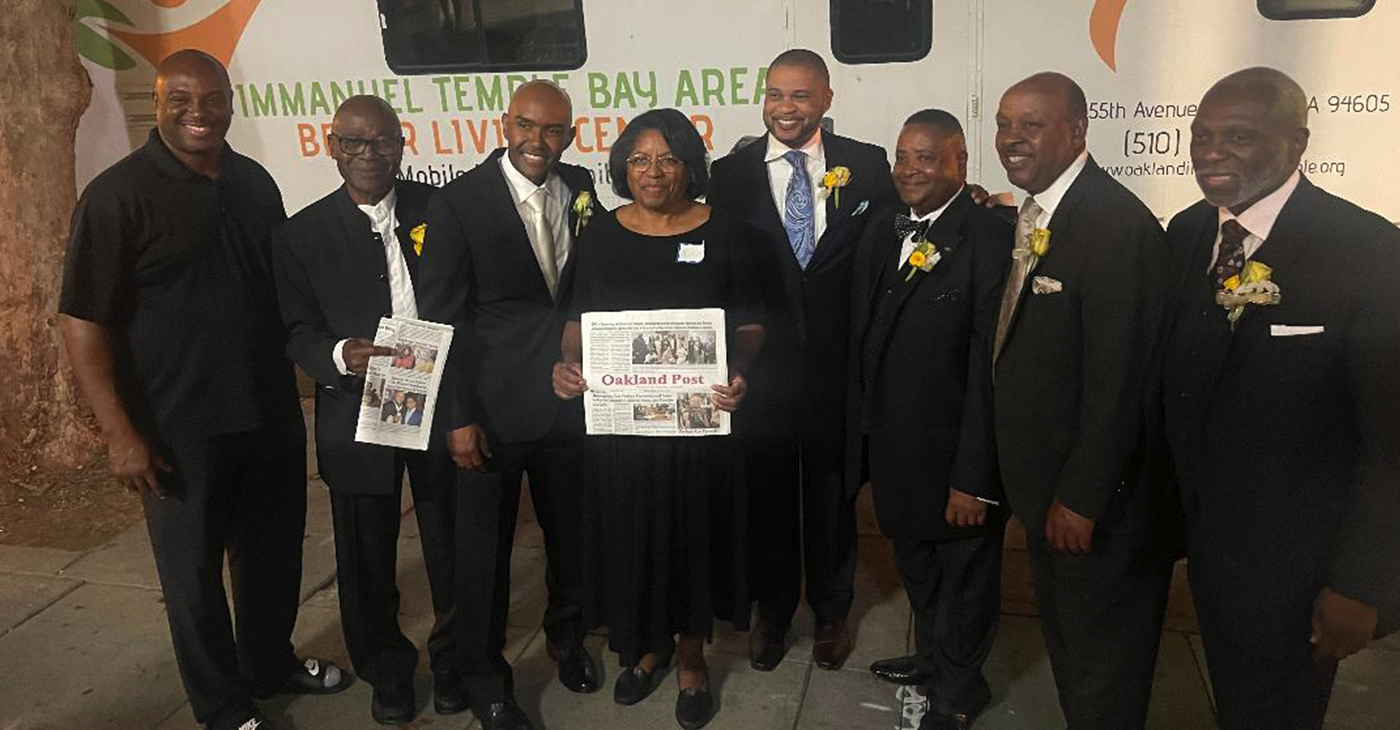
By Post Staff
On Oct. 8, the Northern California Conference of Seventh Day Adventists (SDA) held their annual Convocation at Grand Avenue Seventh Day Adventist Church in Oakland. Seven hundred people came together in celebration and worship. The theme was “Embracing Change.” The guest speaker was Dr. Myron Edmonds, who pastors in Cleveland, Ohio. He spoke about how Christ wasn’t a traditionalist, and the work isn’t being done because some in the church don’t wish to change and they tend to demonize new ideas.
Throughout the day, the Mobile Medical Health Van operated by Immanuel Temple Seventh Day Adventist Church out of Oakland sat in front of the church and provided health screenings and community resource information to the general public. The Medical Van, which was gifted to the church by Pastor Raymond Lankford of Healthy Communities, has provided free health care services throughout Alameda County for the last few years. The prayer of Pastor Damon Washington of Immanuel Temple Church, who was ordained during the afternoon program, is for their health ministry to partner with the other providers like OPIC and Oakland Workforce Agencies and to combat the ongoing health disparities and violence within the city and beyond.
They have pledged to work with the Chaplains, the OPIC and the Formerly Incarcerated Giving Back, who want to make amends for the damages they have done to harm Oakland.
-

 Activism4 weeks ago
Activism4 weeks agoOakland Post: Week of March 27 – April 2, 2024
-

 #NNPA BlackPress4 weeks ago
#NNPA BlackPress4 weeks agoCOMMENTARY: D.C. Crime Bill Fails to Address Root Causes of Violence and Incarceration
-

 #NNPA BlackPress4 weeks ago
#NNPA BlackPress4 weeks agoFrom Raids to Revelations: The Dark Turn in Sean ‘Diddy’ Combs’ Saga
-

 #NNPA BlackPress4 weeks ago
#NNPA BlackPress4 weeks agoMayor, City Council President React to May 31 Closing of Birmingham-Southern College
-

 #NNPA BlackPress4 weeks ago
#NNPA BlackPress4 weeks agoBaltimore Key Bridge Catastrophe: A City’s Heartbreak and a Nation’s Alarm
-

 #NNPA BlackPress4 weeks ago
#NNPA BlackPress4 weeks agoBaltimore’s Key Bridge Struck by Ship, Collapses into Water
-

 #NNPA BlackPress4 weeks ago
#NNPA BlackPress4 weeks agoBeloved Actor and Activist Louis Cameron Gossett Jr. Dies at 87
-

 Community1 week ago
Community1 week agoFinancial Assistance Bill for Descendants of Enslaved Persons to Help Them Purchase, Own, or Maintain a Home




